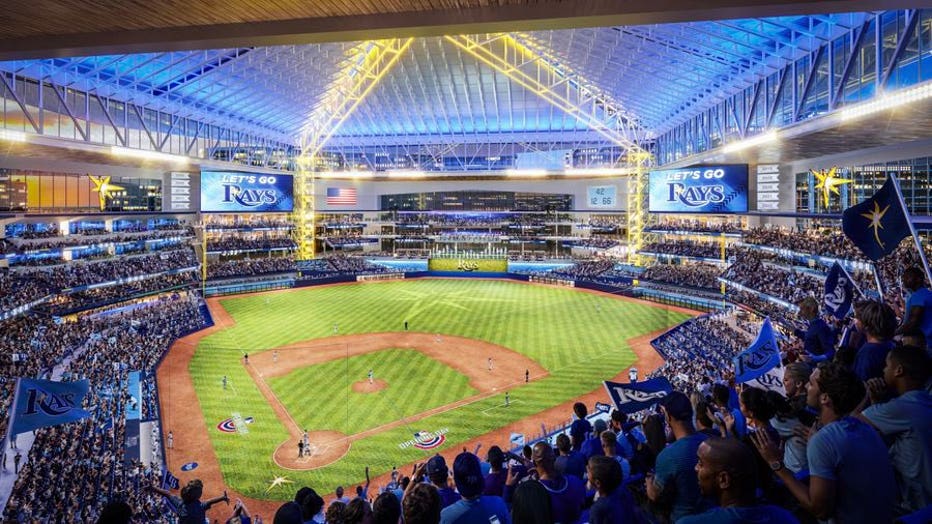St. Pete officials, Rays pitch details on new stadium proposal to city council
ST. PETERSBURG, Fla. - On Thursday, St. Petersburg City Councilors went face-to-face with the Rays for the first time to weigh in on the deal cut between the team and Mayor Ken Welch.
The 113-page presentation put together by Welch and city staff included details on funding, timelines, scope and scale, and expected revenues for the multi-billion-dollar stadium in the Gas Plant District.
St. Pete city council discusses Rays stadium
The St. Petersburg city council will learn more about the new Rays stadium and the Gas Plant District redevelopment.
Over the next four months, councilors must approve the public investment for the team to remain in St. Pete. Councilor Richie Floyd said he is concerned that the public investment won't pay off.
"What is different about this project? Why should we believe our stadium will defy the odds and the academic consensus to provide benefits that studies show they do not provide?"
READ: St. Pete releases terms of agreement between the city and Tampa Bay Rays for stadium plans
The city is slated to contribute $287.5 million in bonds to the project, with the entire cost of the 30,000-seat stadium expected to be $1.3 billion.
Floyd cited studies that show the money the stadium brings in often comes from local residents who would have spent the money locally anyway.
The consultant hired by the city said if the stadium were being built in a vacuum, that could very well be the case. But because it is coming with a larger investment attached to it, the thinking is it will pull even more local money than normal and also attract people from around the region and country.
READ: Rays announce plans for new $1.3 billion stadium in St. Petersburg: 'Our Rays are here to stay'
"If you don't put development together with the stadium, you are right, all of those academic studies are right on point," said David Abrams, a consultant hired by the city to explore the stadium plan. "You only have to look to the Battery in Atlanta to see how there was nothing there, the amount of economic impact that has happened in Cobb County for the Atlanta Braves has been nothing short of astounding.

Rendering of new Rays ballpark.
The ambitious plan sets a 4.5-year timeline for the new home of the Rays.
To get there, the design phase is slated to begin in November, shovels will go in the ground by the fall of 2024, and the team will be able to take the field by the 2028 season.
The Rays told councilors that their timeframe for approvals is critical. One councilor asked for assurances from the county that their approvals would be done by March 1, which is when the city approval is needed by.
Fans react to Rays' new stadium plan in St. Pete
It’s official - the Tampa Bay Rays are here to stay. The team, along with the city of St. Petersburg, announced plans for a new $1.3 billion state-of-the-art ballpark and a transformational development by the Hines Historic Gas Plant Partnership on the 86-acre site where the team's current stadium sits as part of the redevelopment of the Historic Gas Plant District Tuesday morning.
The county representative said they couldn't guarantee it but promised they were working quickly. At the meeting on Thursday, councilors also expressed their enthusiasm at the promise of 7,000 jobs geared towards minority city residents.
"I love the hospitality industry. But I do not want them to all be hospitality positions," said councilor Deborah Figgs-Sanders. "I want us to have viable career sustainable positions of that 7,000. I want to know what the career breakdown looks like and what our targets are and how we are going to prepare our residents to compete for those positions."
In addition to the city's contributions to the investment, the Rays will pay $700 million, and Pinellas County will cover $312.5 million.
"What are some of the checks and balances that we have in place to ensure we are on target to meet these goals and being able to fulfill that part of the promise?" said Councilor John Muhammad. "We have seen projects where we have a target for minority business participation, and then we are woefully short on that goal."
Rays turn to Braves for new stadium inspiration
The Rays are turning to Braves for inspiration with their new stadium plans
The city administration responded to those concerns by saying there are contract compliance offices to make sure the agreements are being followed.
They also say the Rays and the private developers have shown that they will work hard to make sure their concerns are avoided.
They have promised to hold workshops to bring small, women owned and minority businesses into the project.
READ: Gas Plant District in St. Pete: One of the oldest Black neighborhoods razed for baseball
St. Pete Mayor Ken Welch grew up in the Gas Plant District, a historically Black neighborhood that was demolished in the 1970s to make way for nearby highways and eventually the trop. Welch says the city is finally on the precipice of the realization of promises made to the community 40 years ago.
"You’re going to have a destination that really is going to define St. Pete for generations to come. Hopefully we have a couple of World Series pendants in the building, and you’ll see a diversity of folks working on the phases to come, and folks from all over enjoying St. Pete and our vibrant city," said Welch.

